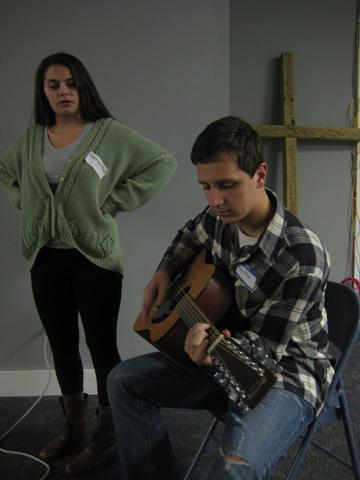

The name “Anchorsaway” may conjure up images of boating enthusiasts or a sailor society, coming together to discuss sea routes and shipping equipment. To picture the real essence of the group, however, replace the sailors with students — juniors and seniors — who are searching for a way to sustain their belief in Christianity in their upcoming college years. Their captain is Nancy Fitzgerald, founder of the Anchorsaway program, and although the group of 35 is unaffiliated with any one church, they all have one thing in common: each Tuesday night, from 7 to 9 p.m., they gather at Genesis Church to hear one of the 11 lectures Fitzgerald gives in the course of a semester.
Fitzgerald, who was raised as an atheist, said her quest did not originate as a way to validate Christianity, but merely as a journey to find a religion that she could relate to.
“I grew up an atheist for 32 years,” Fitzgerald said. “What changed was that I knew there must be more to life than living for cars, country clubs and homes. So I began to revisit the idea of a God that I had missed due to my own ignorance as an atheist and my own anger as an atheist. I looked at all religions.”
This search led her everywhere from Buddhism to Judaism, but for Fitzgerald, every religion lacked the validity to support its claims until she researched Christianity. According to Fitzgerald, the historical accounts in the Bible, as well as the fulfilled prophecies foretold in the Old Testament, presented a strong case for Christianity.
“I looked at the way (the scriptures are) written. When a book is written over 1,500 years, with 40 generations (and) 40 authors, I have to look at that. Yet, there was one continuous theme. So I figured God had to have a hand in this, if there was a God, someway he had to be involved,” Fitzgerald said.
“Then I considered this whole idea of prophecy, which was it for me. No other religious book has prophecy that was foretold and then comes to fruition, 600 to 700 years prior to it happening. There’s no way. And I started studying it and there are 2,000 prophecies in the scriptures. No other religion has that. So my thinking was if I could prove one wrong the whole thing would go down. And it just couldn’t be.”
Fitzgerald acknowledged how some might see religion, in general, as a contradiction to her self-proclaimed “linear” and “bent for science” lifestyle. She said these qualities, however, are exactly what make her fit to create a program such as Anchorsaway.
“I want these young men and woman to make a decision: Are you going to believe or not?” Fitzgerald said. “And I’m going to boil down the facts that I found, so that they can make an intellectual decision. Christianity is far from leaving your intellect behind. God gave us a mind so we can use it.”
Ellen Bankston, Anchorsaway attendee and junior, said she recognizes the importance of using facts to support religion, particularly as she prepares to head off to college.
“It’s important because so many people don’t know what they actually believe or how to defend it,” Bankston said. “Also because a lot of college students will lose their faith through college, so this helps you hold onto it.”
This year is the first for the Anchorsaway program that juniors, such as Bankston, have the opportunity to participate. Previously, only high school seniors were allowed to attend. “We don’t have more space, but we did want to invite them,” Fitzgerald said. “This stuff is so dense, after hearing back from the seniors who were saying, ‘We don’t want to stop; we’re just getting a hang of it.’ Juniors aren’t quite (thinking about college) yet, but at least it will be familiar to them next year when they are.”
When defining the goal of Anchorsaway, Fitzgerald included not only presenting young minds with the information to make smart religious choices, but also presenting the ways that the New Testament encourages followers to make their life choices.
“The choice (to believe) for me was easy, living it out was a challenge. Scripture is very clear that we are all broken, and he uses broken people to deliver our message,” Fitzgerald said. “So what we’re trying to do is teach simple, profound truths. They’re simple – love God and love others – but they’re profound because we’re fighting the battle of being broken human beings ourselves.”




























![Keep the New Gloves: Fighter Safety Is Non-Negotiable [opinion]](https://hilite.org/wp-content/uploads/2024/12/ufcglovescolumncover-1200x471.png)















































![Review: “We Live in Time” leaves you wanting more [MUSE]](https://hilite.org/wp-content/uploads/2024/12/IMG_6358.jpg)
![Review: The premise of "Culinary Class Wars" is refreshingly unique and deserving of more attention [MUSE]](https://hilite.org/wp-content/uploads/2024/12/MUSE-class-wars-cover-2.png)
![Introducing: "The Muses Who Stole Christmas," a collection of reviews for you to follow through winter [MUSE]](https://hilite.org/wp-content/uploads/2024/12/winter-muse-4.gif)
![Review: "Meet Me Next Christmas" is a cheesy and predictable watch, but it was worth every minute [MUSE]](https://hilite.org/wp-content/uploads/2024/11/AAAAQVfRG2gwEuLhXTGm3856HuX2MTNs31Ok7fGgIVCoZbyeugVs1F4DZs-DgP0XadTDrnXHlbQo4DerjRXand9H1JKPM06cENmLl2RsINud2DMqIHzpXFS2n4zOkL3dr5m5i0nIVb3Cu3ataT_W2zGeDAJNd_E-1200x884.jpg)
![Review: "Gilmore Girls", the perfect fall show [MUSE]](https://hilite.org/wp-content/uploads/2024/11/gilmore-girls.png)
![Review in Print: Maripaz Villar brings a delightfully unique style to the world of WEBTOON [MUSE]](https://hilite.org/wp-content/uploads/2023/12/maripazcover-1200x960.jpg)
![Review: “The Sword of Kaigen” is a masterpiece [MUSE]](https://hilite.org/wp-content/uploads/2023/11/Screenshot-2023-11-26-201051.png)
![Review: Gateron Oil Kings, great linear switches, okay price [MUSE]](https://hilite.org/wp-content/uploads/2023/11/Screenshot-2023-11-26-200553.png)
![Review: “A Haunting in Venice” is a significant improvement from other Agatha Christie adaptations [MUSE]](https://hilite.org/wp-content/uploads/2023/11/e7ee2938a6d422669771bce6d8088521.jpg)
![Review: A Thanksgiving story from elementary school, still just as interesting [MUSE]](https://hilite.org/wp-content/uploads/2023/11/Screenshot-2023-11-26-195514-987x1200.png)
![Review: "When I Fly Towards You", cute, uplifting youth drama [MUSE]](https://hilite.org/wp-content/uploads/2023/09/When-I-Fly-Towards-You-Chinese-drama.png)
![Postcards from Muse: Hawaii Travel Diary [MUSE]](https://hilite.org/wp-content/uploads/2023/09/My-project-1-1200x1200.jpg)
![Review: "Ladybug & Cat Noir: The Movie," departure from original show [MUSE]](https://hilite.org/wp-content/uploads/2023/09/Ladybug__Cat_Noir_-_The_Movie_poster.jpg)
![Review in Print: "Hidden Love" is the cute, uplifting drama everyone needs [MUSE]](https://hilite.org/wp-content/uploads/2023/09/hiddenlovecover-e1693597208225-1030x1200.png)
![Review in Print: "Heartstopper" is the heartwarming queer romance we all need [MUSE]](https://hilite.org/wp-content/uploads/2023/08/museheartstoppercover-1200x654.png)




